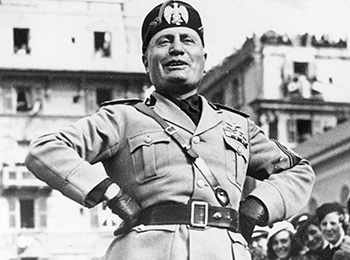Although victory often eluded Benito Mussolini on the fields of Mars, it seldom abandoned him in the boudoirs of Venus.
A latter-day Casanova, Mussolini revelled in his deserved reputation as the quintessential Latin lover. His insatiable appetites led to two wives, hundreds of affairs, and numerous casual encounters. “There was a time when I had 14 women and took three or four of them every evening, one after the other,” he once said.
Less known about Mussolini’s affairs, however, are the passionate liaisons he had with three Jewish women. Clearly, despite his prejudices, Il Duce was an equal opportunity lover.
“From 1912 to 1914, Mussolini was the Che Guevara of his day, a living saint of leftism,” writes David Ramsay Steele in Mystery of Fascism. A dedicated Marxist, Mussolini would mesmerize the masses with his magnetic personality, fierce penetrating eyes, courage, charisma and fiery oratorical gifts. Little wonder then that he caught the eye of Angelica Balabanoff, the socialite daughter of a Russian Jewish millionaire, who rejected her family’s bourgeois lifestyle and proceeded to fall madly in love with Mussolini.
The pair met in Milan where Mussolini had begun his new job as editor of the leftist publication Avanti. He hired Balabanoff as his assistant editor because she knew Vladimir Lenin and was well respected in European socialist and labour movements.
In her biography, My Life as a Rebel, Balabanoff described their first meeting at an international celebration of the Paris Commune in Geneva: “He was one of the speakers. He sat tense and pale, nervously twisting his fingers, absorbed in himself and isolated from the crowd. He was more shabbily dressed than anyone else and more unkempt and dirty. But when he spoke, he acquired assurance, his eyes shone dark and fiery, and his square jaw pushed forward adding power to his words.”
Their affair may well have been the reason behind Mussolini’s decision to leave his long-suffering wife, Rachele, and their two-year-old daughter Edda in Forli when he moved to Milan. As discussed by Mussolini’s biographer, Laura Fermi, a prevalent rumour of the time was that Edda might have been Balabanoff’s illegitimate daughter adopted by Rachele to avoid a scandal. This was strenuously denied by both women and subsequently by Edda as well.
After Mussolini traversed from one ideological extreme to the other, a bitterly disappointed Balabanoff ended the affair. Later in life, as a committed anti-Fascist activist, she would reminisce about Mussolini’s timorousness, lack of character, infidelity and “inspired mediocrity.”
Of course, a clash in views was not the sole factor in their relationship’s decline. While the ideological rift between the pair was certainly strongly felt, Mussolini’s plethora of affairs could not have helped matters either.
Before Balabanoff entered the picture, around the time Edda was born, Mussolini experienced a torrid affair with a married Jewish woman of Polish descent, Fernanda Ostrovski. She too was a passionate socialist who gifted Mussolini with a son born in Trento. The child lived only a few months, and Ostrovski was heartbroken and eventually abandoned by Mussolini.
Mussolini later found solace in the arms of Margherita Sarfatti, a married Jewish woman who stood by him from his days as a socialist agitator all the way through to his ultimate rise to power.
Their affair was unintentionally initiated by Sarfatti’s husband, Cesare. When Sarfatti, already active in socialist causes, received a letter from Cesare in 1911 about “meeting a wonderful young man who [was] destined to dominate the party,” she was instinctively attracted by the idea of a handsome youth unfurling the red flag and leading the masses to the barricades.
She finally met him in the salons of the left and became mesmerized by Mussolini’s virile looks, intellectual energy and boundless self-confidence. Mussolini, too, was drawn to her as she was blonde, beautiful, wealthy, and the wife of a prominent jurist.
For more than 20 years, Mussolini and Sarfatti were involved in a love affair that saw the pair through political publications and intrigues, betrayal of close friends, changes of allegiances and coups d’état. To Mussolini, Sarfatti was an intimate friend, patron and adviser with whom he could share his innermost fears, ambitions and dreams in a way he could not with other women.
It was mainly thanks to her influence that he began to acquire bourgeois manners, shed his rough edges, alter his appearance and begin to take care of his personal hygiene, a trait not considered to be his forte. In short, as the only woman whose advice Mussolini actively sought out, Sarfatti played a key role in Mussolini’s irresistible rise to fame and power. Indeed, she was so close to Mussolini that she can easily be described as one of the founders of Italian fascism.
However, by the 1930s, Sarfatti had lost her looks, and at the apogee of his power, Mussolini did not want to be encumbered by a Jewish woman from his modest past. Desperate not to lose him, Sarfatti converted to Catholicism and frequently reminded her lover that her son had died for Italy during World War I. Although her pleas fell on deaf ears, Sarfatti nevertheless remained steadfast in her love for and loyalty to Mussolini. Indeed, despite her former lover’s anti-Zionist and anti-Semitic policies, she continued to write articles maintaining that there was no “Jewish question” in Italy and that Mussolini “would never follow Hitler’s anti-Semitic policies.”
Despite her claims that there was no cause for alarm, Sarfatti eventually had to escape to Argentina to save her life, and her sister Nella’s family would go on to perish in Auschwitz. After the war, Sarfatti returned to Italy to resume her artistic career and published an unapologetic memoir in 1955. She remained in love with Mussolini all the way until she took her last breath in 1961.
Sarfatti’s enduring love for Mussolini, even after the horrors of the Holocaust became public, confirms Thomas Mann’s observation. “It is love, not reason, that is stronger than death.”
Erol Araf is a Montreal-based strategic planning consultant.
